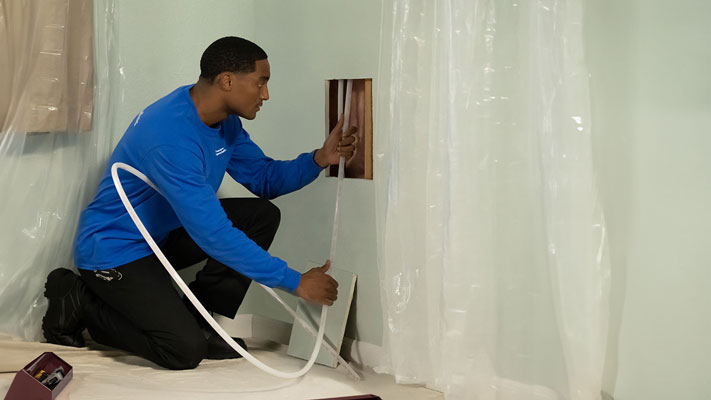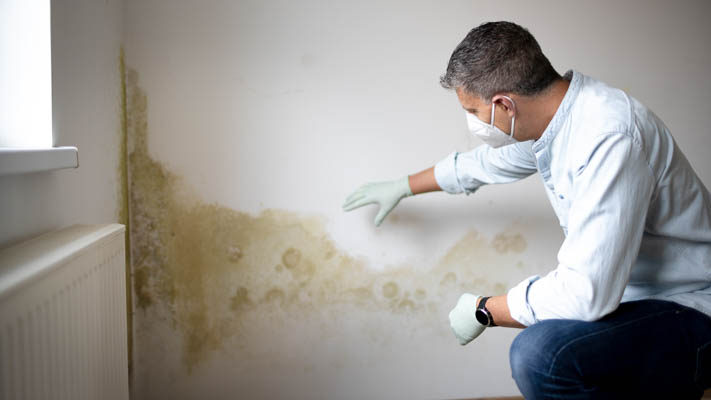What is Polybutylene Plumbing?
Polybutylene plumbing (aka Qest, Quest pipe, poly-b, pb-1 pipe, or just plain "poly pipe") is a type of water supply piping that was commonly used in residential properties from the late 1970s to the mid-1990s.
Polybutylene pipes were once popular because they were affordable and easy to install. However, over time, it became clear that these pipes were prone to failure, which could lead to leaks and water damage.
Polybutylene pipes are made from a flexible plastic resin that can withstand freezing temperatures. These pipes are usually gray and are commonly used in the water distribution system within walls, ceilings, and floors of homes.
Why is Polybutylene Plumbing Problematic?
Polybutylene plumbing has several inherent problems that make it prone to failure:
- Deterioration and brittleness: Over time, polybutylene pipes are susceptible to degradation, becoming brittle and prone to cracks and fractures. This deterioration is often caused by reactions with certain chemicals commonly found in municipal water supplies. These reactions can accelerate the degradation process, further increasing the risk of failure.
- Lawsuits and insurance concerns: Polybutylene plumbing has been the subject of numerous lawsuits due to widespread failures and resulting property damage. Many insurance companies have restrictions or exclusions for homes with polybutylene pipes, making it challenging to completely cover polybutylene failures. There has been prior litigation concerning polybutylene plumbing, however the final deadline for eligibility to receive compensation passed a number of years ago. We have state specific polybutylene insurance articles for Florida, Arizona, and Illinois.
- Reduced property value: Homes with polybutylene plumbing may experience significant problems to reduced property value and selling. Potential buyers may be hesitant to purchase a home with polybutylene pipes, making it essential to address the issue before selling.
Get your free estimate today
With over 75,000 repipes completed, we've perfected our One-Stop Repipe™ for your home.
What are the Signs of Polybutylene Plumbing Issues?
There are several signs that indicate potential issues with polybutylene plumbing. These include:
Frequent leaks or water damage: Polybutylene pipes are susceptible to deterioration and can develop small fractures and cracks over time. These cracks can lead to leaks, which may result in water damage to your home's structure and belongings.
Reduced water pressure: Deterioration of polybutylene pipes can restrict the flow of water, resulting in reduced water pressure in your faucets, showers, and other fixtures. For more information, you can read our ultimate guide to low water pressure.
Discolored or foul-smelling water: As polybutylene pipes degrade, they can release chemicals into the water supply, causing discoloration or foul odors. This can affect the taste and quality of your drinking water.
Cracked or brittle pipes: Polybutylene pipes become brittle with age and may develop visible cracks or signs of deterioration. These cracks can be a precursor to leaks and should be addressed promptly.
Deteriorated fittings or connectors: The fittings and connectors used with polybutylene pipes are also prone to deterioration. If you notice signs of corrosion or leakage around these components, it may indicate a problem with your polybutylene plumbing system.
What Materials are Recommended for Repiping Polybutylene Plumbing?
When repiping polybutylene plumbing, we recommend using either copper piping or PEX tubing. Choosing whether you should repipe with copper or PEX can be a hard decision to make. The choice will depend on your specific needs, budget, and preferences.
- Copper piping: Copper has long been a trusted material for plumbing systems. It is known for its durability and longevity. Copper pipes have a proven track record and can last for decades with proper installation and maintenance. We have a thorough article detailing the advantages of copper piping.
- PEX tubing: PEX (cross-linked polyethylene) tubing has gained popularity in recent years due to its flexibility, ease of installation, and resistance to corrosion. PEX is a flexible plastic tubing that can easily bend and fit through tight spaces, making it perfect for repiping projects. It's known for its durability and is less likely to crack or burst compared to rigid materials. PEX offers a cost-effective and reliable solution for homeowners looking to update their plumbing.

At Repipe Specialists, we utilize both Grade-L copper piping and Uponor PEX-A tubing for our repiping projects, depending on the specific requirements of each home. Our team of experts will assess your plumbing system and recommend the most suitable material for your repipe.
Should I Repipe My Home if it has Polybutylene Plumbing?
If your home has polybutylene plumbing, we highly recommend considering a repipe.
The potential for leaks and water damage associated with polybutylene pipes can cause significant issues and costly repairs. Repiping your home with more reliable and durable materials, such as copper piping or PEX tubing, will provide you with long-term peace of mind and protect your property from water-related damage.

Here at Repipe Specialists, we have extensive experience in repiping homes with polybutylene plumbing. We've successfully completed thousands of repiping projects, providing homeowners with reliable and long-lasting plumbing systems. Our team of experts will assess your specific needs and provide you with a customized solution tailored to your home.
During the repiping process, our highly skilled technicians will remove the existing polybutylene pipes and replace them with modern, reliable materials. Whether you choose copper piping or PEX tubing, our goal is to deliver a high-quality repipe that exceeds your expectations.
How Much Does it Cost to Replace Polybutylene?
In general, our repipes fall somewhere between $4,500 for a two-bedroom, one-bath house, and up to $15,000 for a much larger, more complicated job.
At Repipe Specialists, we solely focus on whole-home repiping. Our dedicated repipe crews work in teams, allowing us to complete the job within one to two days. This reduces labor costs and ensures a swift replacement of your plumbing system.
We also offer free quotes for polybutylene plumbing repipes to help you make an informed decision about your repiping needs. For more information, check out our article on how much it costs to replace polybutylene pipes.
Receive a Free Quote for Your Polybutylene Plumbing Repipe
Here at Repipe Specialists, we've fully replaced the plumbing in over 75,000 homes since 1991 using both copper piping and PEX tubing. We continually get positive customer feedback from customers about their overall home repipe experiences. We often exceed their expectations on:
- Speed: Our repipe crews typically complete a repipe in a day, returning on another day for wall patching.
- Convenience: Through our One-Stop Repipe™ process, we handle everything from permits, to wall patching, to inspections.
- Cleanliness: Our crews are trained to protect your home while working (we cover all surfaces with protective sheeting), and to clean up fully at the end of each day.
- Peace of Mind: Repipe Specialists is a fully licensed plumber in every state we operate in, and we back all of our repipes with a lifetime warranty.
- Financing programs: To help take the sting out of unplanned repipe expenses, we offer several financing programs.
- Price: As a specialist that performs hundreds of repipes a week, we can deliver high-quality repipes at a lower cost vs generalist plumbers. We have an article that covers repipe cost factors in detail.
Schedule a free in-home consult, and one of our local repipe consultants will explain all your repipe options and provide you with a written, fixed-price quote. Repipe your damaged polybutylene plumbing today.

